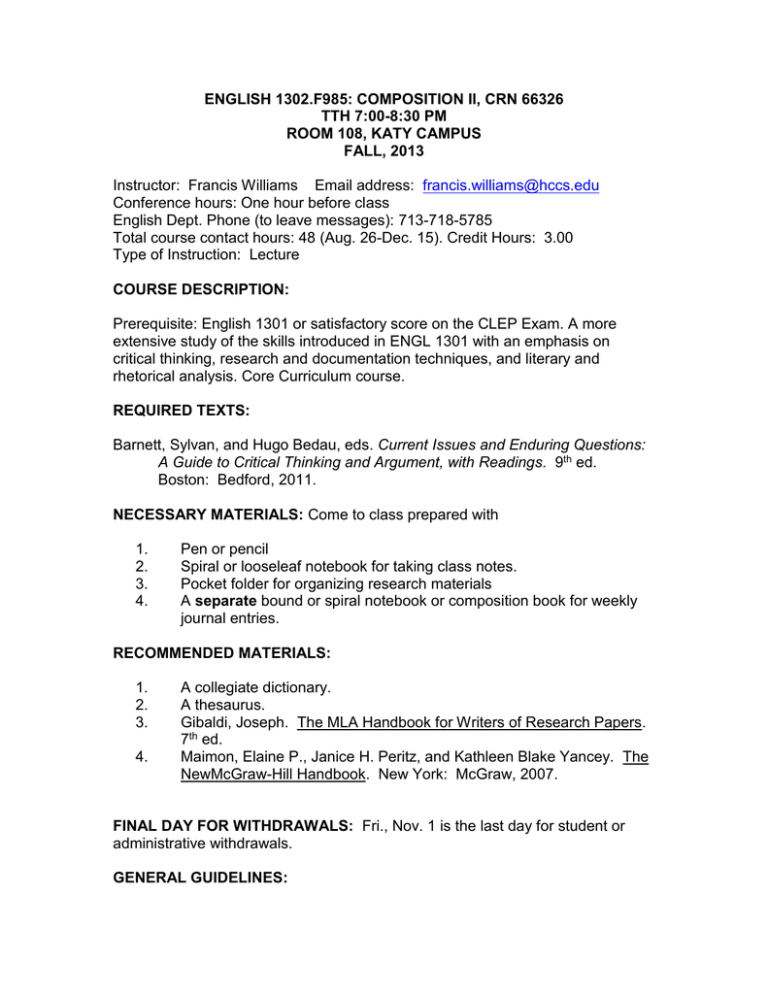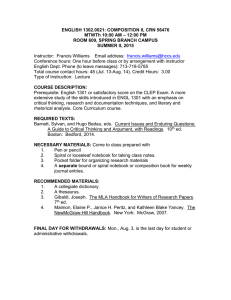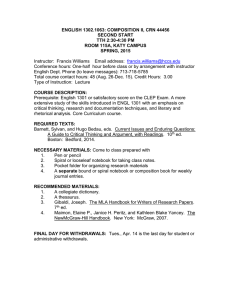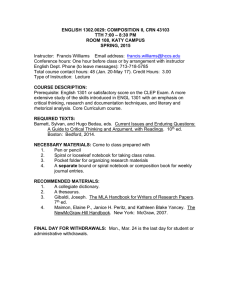HCCS 1302 Syllabus TTh 700 Fall 2013.doc
advertisement

ENGLISH 1302.F985: COMPOSITION II, CRN 66326 TTH 7:00-8:30 PM ROOM 108, KATY CAMPUS FALL, 2013 Instructor: Francis Williams Email address: francis.williams@hccs.edu Conference hours: One hour before class English Dept. Phone (to leave messages): 713-718-5785 Total course contact hours: 48 (Aug. 26-Dec. 15). Credit Hours: 3.00 Type of Instruction: Lecture COURSE DESCRIPTION: Prerequisite: English 1301 or satisfactory score on the CLEP Exam. A more extensive study of the skills introduced in ENGL 1301 with an emphasis on critical thinking, research and documentation techniques, and literary and rhetorical analysis. Core Curriculum course. REQUIRED TEXTS: Barnett, Sylvan, and Hugo Bedau, eds. Current Issues and Enduring Questions: A Guide to Critical Thinking and Argument, with Readings. 9th ed. Boston: Bedford, 2011. NECESSARY MATERIALS: Come to class prepared with 1. 2. 3. 4. Pen or pencil Spiral or looseleaf notebook for taking class notes. Pocket folder for organizing research materials A separate bound or spiral notebook or composition book for weekly journal entries. RECOMMENDED MATERIALS: 1. 2. 3. 4. A collegiate dictionary. A thesaurus. Gibaldi, Joseph. The MLA Handbook for Writers of Research Papers. 7th ed. Maimon, Elaine P., Janice H. Peritz, and Kathleen Blake Yancey. The NewMcGraw-Hill Handbook. New York: McGraw, 2007. FINAL DAY FOR WITHDRAWALS: Fri., Nov. 1 is the last day for student or administrative withdrawals. GENERAL GUIDELINES: Please be on time for classes. It is rude and distracting regularly to arrive late. Students who are persistently late may have points deducted from assignments. Students who are unprepared, who sleep in class, who do not pay attention, or who are disruptive will be asked to leave class and will be counted absent. ELECTRONICS POLICY: Do not bring laptops or other electronics to class. The exception to this is students who are certified by the Disability Services Office to require an in-class laptop for notetaking. Turn cell phones to vibrate and silence them. Do not take them out of your pocket or purse except at class break. Students who text in class will be asked to leave and will be given an absence for that session. ABSENCES: It is very important that you attend regularly to keep up with what is going on. This is a “face” class, not a distance learning or blended class, so you will miss assignments and fall behind if you are not here. You are responsible for material covered and assignments given in classes from which you are absent. Swap phone numbers or email addresses with another student so you may acquire material and assignments you have missed. Students may be dropped for excessive absences. PLAGIARISM: To present other authors’ work as your own, without giving proper acknowledgment, is plagiarism, a serious academic offense. Plagiarism includes, but is not limited to, copying essays from books or journals, downloading papers from free or pay websites, buying or borrowing essays written by others, cutting and pasting material from different websites without providing proper acknowledgement, or using direct quotations from someone’s work without indicating the words are the other author’s and not your own. Any plagiarized work will be given a zero, and you will NOT be given an opportunity to rewrite. GRADED ASSIGNMENTS THIS SEMESTER: All papers written outside of class must be typed; handwritten papers will not be accepted. Papers may be submitted electronically to the instructor as Microsoft Word files attached to emails. Do not type the paper directly into the email. Students who miss more than five classes will lose the privilege of submitting papers electronically and must bring the papers to class in person. Work submitted after the due date will have five points deducted for each late day; work that is one calendar week late will be given a zero. Research paper: The research paper, for which you will choose the topic, should be a minimum of four full pages, not counting the Works Cited page; points will be deducted for shorter papers. Your Works Cited must include a minimum of five sources, prepared according to MLA format. The sources must include at least one book and at least one periodical article (newspaper story, magazine or journal article, etc.). These may be in either electronic or print form. You may also use other electronic sources such as websites, commercial software, CDs, and databases. I encourage you to use as many different types of sources as you can. Sources should not be listed in the Works Cited unless information from these sources is documented in the body of the paper. General encyclopedias, such as Compton’s and the Americana; Wikipedia entries; and general dictionaries are not suitable sources for a college paper, so don’t put them in the Works Cited. You must submit with your paper a photocopy of each parenthetical citation. Failure to submit the photocopies, absence of a Works Cited page, or absence of parenthetical citation in a paper will result in an automatic F. You may select any current events topic for your research paper, but remember: the paper must be argumentative and persuasive, not just informative. The first draft of your research paper (Synthesis paper) counts 10% of your total grade; the final draft counts 20%. Major essays: You will write two shorter, undocumented papers of two to three pages each. These papers may be in response to assigned readings Final exam: The final exam will be a timed essay in response to your choice of various short readings selected by the instructor. Daily grades: You will have a variety of shorter assignments such as homework, pop quizzes over readings or lectures, steps leading to the completed research paper, and brief writing assignments. I will not accept any late daily work; if you are not there when an assignment is due, you get a zero. However, there is a built-in curve. I will automatically drop your lowest grade in this category before figuring your final average. Your semester grade will be figured according to the following percentages: Final draft of research paper Preliminary draft of research paper Major essays (10% each) Final exam Daily grades 20% 10% 20% 20% 30% 100% Policies for Missed and Late Work: If a major essay is late, five points per day will be deducted, and you will lose the option to rewrite that paper. If a major paper is over one week late, it will be given a zero. No daily grade assignments will be accepted late under any circumstances. Assignments that are submitted on time will be graded and returned promptly. Late assignments will be graded at the instructor’s convenience. Unless otherwise indicated, assignments are due on the last day we meet for class that week. Rewrites: The major essays (see above) may be rewritten for a higher grade. A rewrite must be turned in the next class after the graded original was returned or it will not be graded, and the original grade will remain in place. A rewrite will not be graded unless the original paper with the instructor’s comments accompanies it. The final research paper draft is the rewrite of the preliminary draft. Tentative Schedule: This schedule is subject to change, so you still need to attend class to keep up with assignments. Assigned readings should be completed before you come to class as there may be a pop quiz over the material. WEEK 1 (Aug. 27, 29) Introduction to course. Diagnostic essay. How to find a topic for the research paper. WEEK 2 (Sept. 3, 5) Writing summaries. General introduction to research. Readings as assigned. In-class journal writing. MON., SEPT. 2 IS LABOR DAY HOLIDAY. NO CLASS TODAY. WEEK 3 (Sept. 10, 12) General introduction to argumentation. General subject for research paper due. Thesis and evidence. Critical reading. In-class journal writing. WEEK 4 (Sept. 17, 19) Types of argumentation (Toulmin, Rogerian). *Summary paper due (Major Essay #1) due. Readings as assigned. In-class journal writing. WEEK 5 (Sept. 24, 26) Writing a critical analysis. Outlining. Readings as assigned. In –class journal writing. WEEK 6 (Oct. 1, 3) Taking notes for the research paper. The reader as audience. *Critical analysis due (Major essay #2). In-class journal writing. WEEK 7 (Oct. 8, 10) Review critical analysis. Improving sentence variety. Wordiness. Readings as assigned. In-class journal writing. Preliminary outline for research paper due. WEEK 8 (Oct. 15, 17) Readings as assigned. In-class journal writing. Review preliminary outlines. Diction and vocabulary. General introduction to MLA format. WEEK 9 (Oct. 22, 24) MLA format (continued). Readings as assigned. In–class journal writing. Preliminary Works Cited for research paper due Thursday. Review preliminary Works Cited. In-class journal writing. WEEK 10 (Oct. 29, 31) How to type research draft. Question-and-answer session over papers. Inclass journal writing. Readings as assigned. WEEK 11 (Nov. 5, 7) Preliminary draft of research paper due Tuesday. Mechanics and punctuation. In-class journal writing. WEEK 12 (Nov. 12, 14) Review preliminary drafts of research papers. Tuesday: Question-andanswer session over research papers. Peer Review of research papers; bring hard copy to class. In-class journal writing. WEEK 13 (Nov. 19, 21) FINAL DUE DATE FOR RESEARCH PAPERS IS THIS TUESDAY. Introduction to literature. Mechanics and punctuation. Begin review for final exam. In-class journal writing. WEEK 14 (Nov. 26, 28) Review for final exam (cont.). THANKSGIVING HOLIDAY IS NOV. 28-DEC. 1. NO CLASS THIS THURSDAY. WEEK 15 (Dec. 3, 5) Final exam for English courses ONLY. WEEK 16 (Dec. 10, 12) Final exams in other departments are given Dec. 9 – 15. Final meeting of this class to review semester grades and return final exams and research papers. Special Needs: Any student with a documented disability (e.g. physical, learning, psychiatric, vision, hearing, etc.) who needs to arrange reasonable accommodations must contact the Disability Services Office at the respective college at the beginning of each semester. Faculty is authorized to provide only the accommodations requested by the Disability Support Services Office. For questions, please contact Donna Price at 713.718.5165 or the Disability Counselor at your college. To visit the ADA Web site, please visit www.hccs.edu then click Future students, scroll down the page and click on the words Disability Information.





